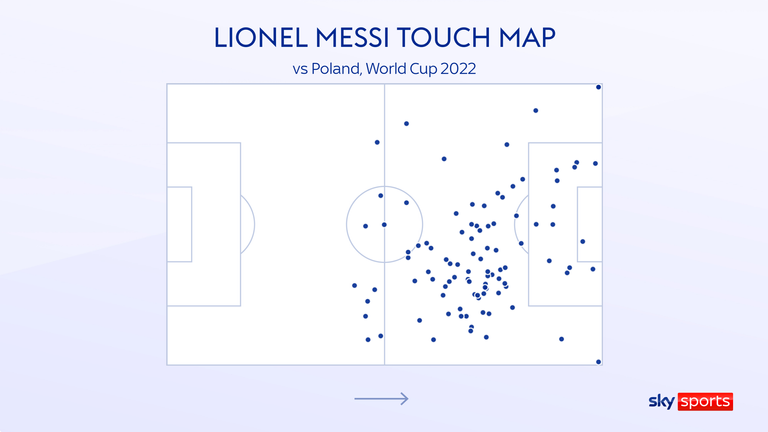
There was no goal for Lionel Messi against Poland. That despite a total of seven shots, one of which was a penalty brilliantly saved by Wojciech Szczesny. But this was a performance to suggest he may yet be destined to carry Argentina to the biggest prize of them all.
The 35-year-old, fresh from scoring the sensational long-range strike which helped Lionel Scaloni’s side overcome Mexico in their last game, produced his best display yet at the tournament, the missed spot kick a blot that ultimately did not matter.
That was largely because of everything else he did.
The records will show Messi had no hand in the goals, with Enzo Fernandez and Nahuel Molina the men to claim the assists for Alexis Mac Allister and Julian Alvarez. But even if the last pass wasn’t always his, Messi was involved at some point in almost every attack.
He had struggled to exert his usual influence against Saudi Arabia and Mexico but not this time. Messi had 98 touches, around 50 per cent more than in either of Argentina’s previous games, and that total included 13 in the Poland box.

It was further back, though, in between the lines, that Messi produced most of his best work, putting on a masterclass in distribution as Poland’s discombobulated defenders found themselves completely unable to keep up with him.
Some of his passes were sublime and, in addition to his seven shots, the statistics showed he was directly responsible for creating five scoring chances – two more than anyone else on the pitch.
There were even five dribbles – more than twice as many as any other player on either side. At times, the feints, shimmies and sudden bursts of acceleration harked back to his glorious peak.
The question now is whether, at 35, the climax of his extraordinary career is still to come. This Argentina side are flawed in many ways. But they also have Messi. With him in this kind of mood, fuelled by an irresistible sense of destiny, they are serious contenders.
Nick Wright

Winning your first two group games in a major tournament can actually cause more headaches than people realise.
Didier Deschamps found that out against Tunisia. Do you keep on rolling by playing the same players that got you into such a dominant position or rest the legs of your star men? You can of course do a bit of both. That is usually how managers approach such a situation.
Yet, Deschamps took a sledgehammer to his team, making nine changes with the hope of his fringe players sending him a message much like the way Marcus Rashford and Phil Foden did for England on Tuesday evening. Well, France did the opposite. They froze which resulted in a lethargic and wholly imbalanced performance that didn’t come to life until Kylian Mbappe arrived on the scene with 25 minutes to go.
France are fancied to go very close in this tournament but if you look at their key rivals Brazil and England, both those teams have benches with the X-factor. France, on this showing, are going to have to rely on a key core of four or five players in order to double up in this World Cup.
Lewis Jones

The margins could not have been finer. It came down to one Saudi Arabia goal in the end, but Poland and Mexico fans alike were hastily googling yellow cards for a 20-minute spell in the final games of Group C.
Although it ended up being a happy evening for Poland in one respect, in many others it was incredibly worrying.
They had just under 27 per cent of possession against Argentina and no shots on target. Poland only registered four shots overall and just one corner, showing how little they ventured into the opposition half.
In their opener against Mexico, they failed to find the net. However, against Saudi Arabia, they had just nine shots, but scored twice. The Middle East nation racked up 16 shots, but were kept at bay by a Poland defence that did not concede until they faced Argentina.
In fact, it has been goalkeeper Wojciech Szczesny who has driven them to a last-gasp last-16 spot. His save from Lionel Messi’s spot kick – which shouldn’t have been a penalty to begin with – epitomised the form he is in.
But Wednesday’s game drastically exposed Poland’s lack of attacking bite with no service to one of the world’s best forwards in Robert Lewandowski. While Szczesny was superb in goal, Poland gave the ball away far too cheaply and too often, overran by an Argentina side who knew what their goal was and where it was, for that matter.
Poland face France in their last-16 match on Sunday and nothing the World Cup holders have seen so far will worry them. Didier Deschamps was afforded the luxury of rotating his squad against Tunisia earlier on Wednesday, giving his starting players a vital extra rest ahead of the knockout rounds.
Simply put, in just three days, Poland need to find a way of subduing a talented France frontline and also getting service into their most talented player. It’s not an easy task, but the only way you can see Poland having a chance of reaching the quarter-finals based on their performance against Argentina.
Charlotte Marsh

Saudi Arabia will always have that remarkable victory over Argentina. Those incredible five second-half minutes when Herve Renard’s side turned the game on its head to stun Lionel Messi and the world.
Who scored the winning goal for Saudi Arabia in their shock win against Argentina? Salem Al-Dawsari will be a pub quiz answer for decades to come.
It was always going to be the toughest act to follow. We never saw Saudi Arabia reach those heights again in Qatar.
Al-Dawsari was the focal point of their World Cup hopes yet he will forever wonder what might have been had his penalty not been saved in their defeat to Poland – but he had the last laugh against Mexico.
Saudi Arabia looked tired in the Group C finale, stifled by a Mexico side whose objective was clear: must-win. They still showed hallmarks of their famous Argentina success, though, defending with everything they had to repel wave after wave of attacks.
Saudi Arabia’s spirit was never broken. Al-Dawsari ran the ball back to the centre circle after scoring his late goal even though their qualification hopes had ended long before.
Renard’s team will return to their country as heroes – and that is the real victory of their memorable World Cup.
David Richardson

The manner of Australia’s win over Denmark, sealing their progression to the knockout stages of the World Cup for just the second time in their history, just about summed up both teams.
Despite heading into this World Cup with the best qualifying record of all European nations, all the discussion around Denmark in the build-up to their Group D decider centred on whether they were able to finish their chances off.
The answer ended up being a resounding no, with former Middlesbrough and Barcelona striker Martin Braithwaite – who was one of three players brought into the starting line-up – cutting a particularly anonymous figure up front.
By contrast, Australia, who looked on the ropes early on as they soaked up wave after wave of Denmark pressure, made the most of their opportunities, registering more shots on target than the Danes, despite mustering barely 30 per cent of the possession.
Mathew Leckie’s goal epitomised the belief, togetherness and the tenacity of this Australian side, who struggled in the second half of their World Cup qualifcation campaign, needing to play and win two rounds of play-offs just to reach Qatar.
Leckie’s first apearance at a World Cup was back in 2014, and his expertly taken goal to round off a precision Australia counter-attack saw him avoid claiming an unwanted record – he had taken the joint most shots on goal for a player never to have scored at a World Cup (16) before his winner against Denmark.
Australia had lost eight of their 11 matches against European opposition heading into the game, but they won this one, and will prove tricky opposition in their last-16 tie with Argentina on Sunday if they can replicate the disciplined performance they put in against Denmark.
Dev Trehan
When Antoine Griezmann’s 98th-minute equaliser was ruled out after the latest of VAR calls at the Education City Stadium, there were a swell of mixed emotions for Tunisia.
It was a bittersweet moment.
The North African nation had, at the fifth attempt, registered their first-ever win against France – the reigning world champions – and deservedly so. But it also did not matter one bit in the context of the 2022 World Cup.
Jalel Kadri’s men did as much as they could on the day, but progression to the last 16 was dependent on Australia failing to beat Denmark in the other Group D clash. Matthew Leckie’s strike ensured that would not be the case.
Truthfully, had they been more potent in attack in their previous two matches, Tunisia might not have found themselves in such a precarious position. They defended admirably against Denmark, yet had just one shot on target, and lost out to Australia by a single goal in a game they, arguably, had the better of.
They got nearly everything right against France and even kept just their third clean sheet in World Cup history. Perhaps they had a spring in their step when they discovered Didier Deschamps made an incredible nine changes to the team that beat the Danes on Saturday.
Drama in the dying embers almost robbed them of a famous win, but though they did eventually get it, it was not enough to see them crash out at the group stage for the sixth time in six appearances on the world stage.
Dan Long
This content was originally published here.









